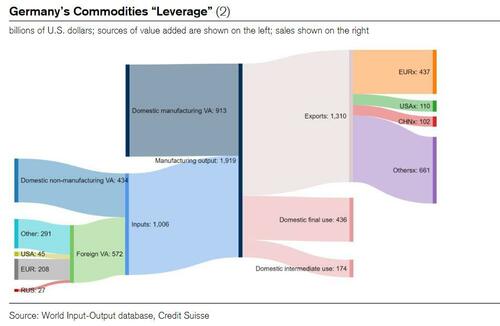
Back in August 2022, repo plumbing guru Zoltan Pozsar published a fascinating chart showing how "$2 Trillion Of German Value Depends On $20 Billion Of Russian Gas" or specifically, how Germany had applied some 100x leverage - much more than Lehman - on cheap commodities, and mostly Russian gas, to cheaply run its export-driven economic miracle for decades.
And with Russia's cheap gas now gone for the foreseeable future, so is Germany's tremendous operating leverage. Which means profit margins will be hammered for years to come.
As proof look no further than a study published Monday by Allianz Trade which cited contract expiries and delayed wholesale pricing effects, and which according to Reuters found that German industry is set to pay about 40% more for energy in 2023 than in 2021, before the energy crisis triggered by Russia's invasion of Ukraine.
"The large energy-price shock still lies ahead for European corporates," said Allianz Trade, the credit insurer that changed its name from Euler Hermes last year.
As a reminder, in 2022, higher corporate utility bills were contained as long pass-through times from wholesale markets and government interventions mitigated the immediate hit from surging prices as Russia curbed fuel exports to the West. The resulting budget deficits were promptly funded by the ECB, which meant that for all the posturing, Christine Lagarde was directly funding Putin's cash build up.
But the pass-throughs are ending, which means that price increases will soon hit corporate profits across Europe by 1-1.5% and lead to lower investment, which in Germany's case would amount to 25 billion euros ($27 billion), Allianz Trade estimated.
The silver lining is that German companies' finances are robust, while a state-imposed gas price cap would help (unless it makes things much worse).
At the same time, fears the crisis could lead to de-industrialisation and a loss of competitiveness against the United States were overdone, because labor costs and exchange rates have a bigger impact on manufacturing than energy prices, the study said. Also, while exporters were losing market shares in areas such as agrifood, machinery, electrical equipment, metals and transport, the relative beneficiaries tended to be Asian, Middle Eastern and African, not American, it added.
Meanwhile, the economic ministry said on Saturday that the German government's one-off payment to help private households and small businesses with gas prices - the first stage of a package that will be complemented with retroactive price caps kicking in in March - has cost 4.3 billion euros so far.
Berlin has earmarked 12 billion euros for the payment, but the ministry said 4.3 billion euros was not the final cost as many eligible firms had not yet applied for the aid. They have until the end of February to apply; and judging by the huge losses they still face, they will.
Back in August 2022, repo plumbing guru Zoltan Pozsar published a fascinating chart showing how “$2 Trillion Of German Value Depends On $20 Billion Of Russian Gas” or specifically, how Germany had applied some 100x leverage – much more than Lehman – on cheap commodities, and mostly Russian gas, to cheaply run its export-driven economic miracle for decades.
And with Russia’s cheap gas now gone for the foreseeable future, so is Germany’s tremendous operating leverage. Which means profit margins will be hammered for years to come.
As proof look no further than a study published Monday by Allianz Trade which cited contract expiries and delayed wholesale pricing effects, and which according to Reuters found that German industry is set to pay about 40% more for energy in 2023 than in 2021, before the energy crisis triggered by Russia’s invasion of Ukraine.
“The large energy-price shock still lies ahead for European corporates,” said Allianz Trade, the credit insurer that changed its name from Euler Hermes last year.
As a reminder, in 2022, higher corporate utility bills were contained as long pass-through times from wholesale markets and government interventions mitigated the immediate hit from surging prices as Russia curbed fuel exports to the West. The resulting budget deficits were promptly funded by the ECB, which meant that for all the posturing, Christine Lagarde was directly funding Putin’s cash build up.
But the pass-throughs are ending, which means that price increases will soon hit corporate profits across Europe by 1-1.5% and lead to lower investment, which in Germany’s case would amount to 25 billion euros ($27 billion), Allianz Trade estimated.
The silver lining is that German companies’ finances are robust, while a state-imposed gas price cap would help (unless it makes things much worse).
At the same time, fears the crisis could lead to de-industrialisation and a loss of competitiveness against the United States were overdone, because labor costs and exchange rates have a bigger impact on manufacturing than energy prices, the study said. Also, while exporters were losing market shares in areas such as agrifood, machinery, electrical equipment, metals and transport, the relative beneficiaries tended to be Asian, Middle Eastern and African, not American, it added.
Meanwhile, the economic ministry said on Saturday that the German government’s one-off payment to help private households and small businesses with gas prices – the first stage of a package that will be complemented with retroactive price caps kicking in in March – has cost 4.3 billion euros so far.
Berlin has earmarked 12 billion euros for the payment, but the ministry said 4.3 billion euros was not the final cost as many eligible firms had not yet applied for the aid. They have until the end of February to apply; and judging by the huge losses they still face, they will.
Loading…






